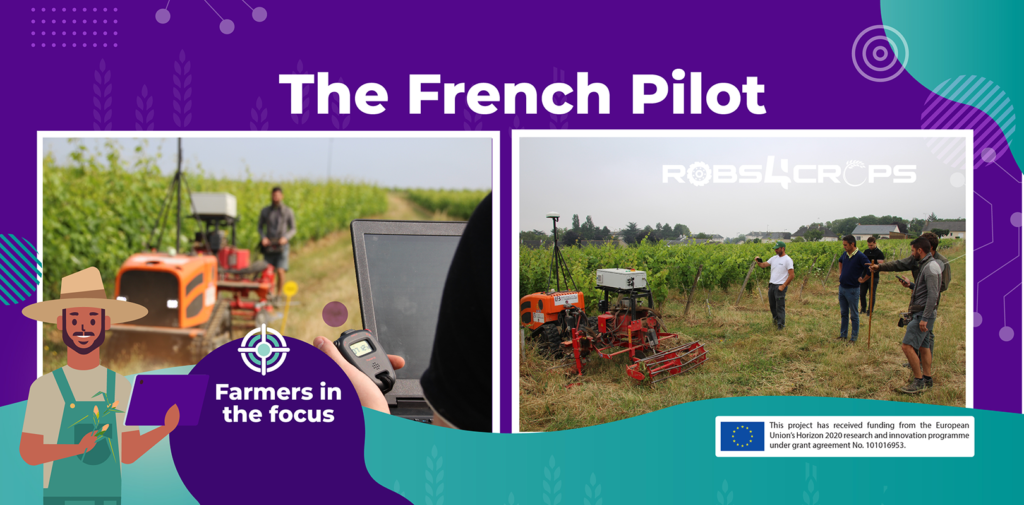A pilot project is currently being implemented in France to mitigate the environmental impact of vineyards by replacing chemical weed control with mechanical weeding. However, traditional methods are both expensive and challenging to manage, exacerbated by a shortage of skilled tractor drivers. In response to these challenges, the French pilot team is introducing two promising CEOL robots, specifically tailored for use in vineyards. These state-of-the-art robots aim to revolutionize vineyard management while promoting sustainability and empowering farmers.
 1. What are the primary concerns and reservations surrounding the implementation of robots in agriculture, and how can these challenges be effectively addressed?
1. What are the primary concerns and reservations surrounding the implementation of robots in agriculture, and how can these challenges be effectively addressed?
Concerns surrounding the implementation of robots in agriculture revolve around farmers’ adaptability to new technology. Limited experience with advanced tools like robots can create reservations among farmers. This challenge can be overcome by providing guidance, training, and support during the adoption of robotic technology.
Another issue is the cost of agricultural robots, particularly for small-scale farms. The initial investment, training expenses, and additional services may deter some farmers.
Additionally, the pace of technical advancements can be frustrating for farmers. Regular communication about progress within the Robs4Crops project can help address this concern.
Legislative limitations also pose a reservation, as they often evolve slowly.
 2.What practical steps can be taken to adapt existing farming infrastructure and seamlessly integrate robotic systems, empowering farmers to optimize their operations?
2.What practical steps can be taken to adapt existing farming infrastructure and seamlessly integrate robotic systems, empowering farmers to optimize their operations?
 3. In order to work alongside robots, how can farmers and agricultural workers adapt, acquire necessary skills, and seize opportunities for retraining and upskilling, ultimately empowering themselves in the agricultural sector?
3. In order to work alongside robots, how can farmers and agricultural workers adapt, acquire necessary skills, and seize opportunities for retraining and upskilling, ultimately empowering themselves in the agricultural sector?
In order to adapt and acquire necessarily skills to work alongside the robots, farmers can stay informed about technological advancements in the agricultural sector. They can do this by attending trade shows, participating in robotic demonstration events, or engaging in exchanges and collaborations with other agricultural workers (other farmers, experts, …).
Training programs offered by robotic system developers are also valuable in learning effective and safe practices while working alongside robots.
 4. What will be the main focus of your demonstration sessions this season, considering the previous question?
4. What will be the main focus of your demonstration sessions this season, considering the previous question?
The first demonstration session of this season focused on two key areas: exploring the potential of using robots in agriculture and conducting user experience tests on the CEOL robot, currently utilized within LSP1.
The focus of the second demonstration for the Large-Scale Pilot is yet to be determined.
 5.How can farmers and other stakeholders effectively collaborate with technology developers and researchers to address the specific challenges and limitations of robotic agriculture?
5.How can farmers and other stakeholders effectively collaborate with technology developers and researchers to address the specific challenges and limitations of robotic agriculture?
To effectively tackle the specific challenges and limitations of robotic agriculture, collaboration among farmers, researchers, technology developers, and other stakeholders is essential throughout the development process. This collaboration can take on various forms:
• Technology developers and researchers should engage in field trials conducted in collaboration with farmers. These trials help assess the robots’ performance in real agricultural conditions and gather valuable feedback from farmers to make necessary improvements.
• User experience tests should be conducted by technology developers and researchers, involving farmers to gather feedback on the usability of robotic systems. Ensuring that the developed robots are user-friendly and relevant for end-users is a crucial aspect of this process.
• Organizing collaborative sessions that bring together all stakeholders is vital. These sessions address the diverse questions and concerns raised during the development of robotic agriculture.
In conclusion, within the Robs4Crops project, these three types of collaborations are currently adopted and utilized to drive advancements in robotic agriculture. By working together, stakeholders can effectively overcome challenges and propel the development of sustainable and efficient agricultural technologies.

